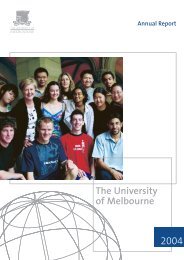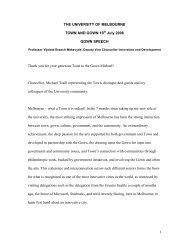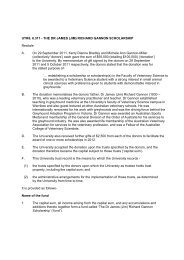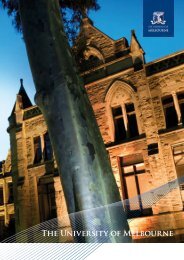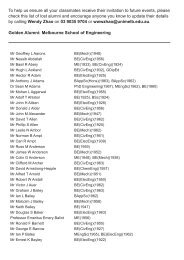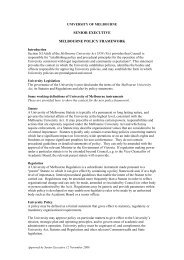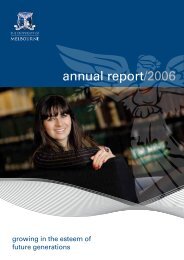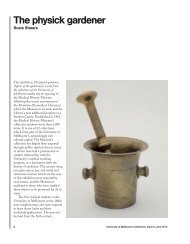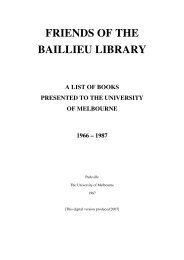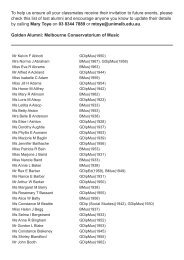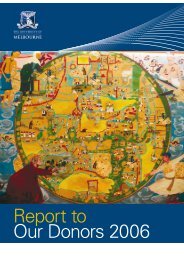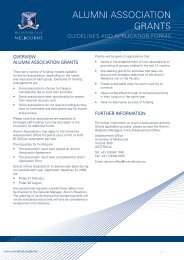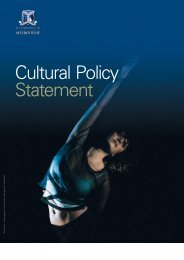2010 International Undergraduate Prospectus nts. u.au
2010 International Undergraduate Prospectus nts. u.au
2010 International Undergraduate Prospectus nts. u.au
Create successful ePaper yourself
Turn your PDF publications into a flip-book with our unique Google optimized e-Paper software.
138<br />
Glossary<br />
of Terms<br />
a<br />
Assessment: tasks you are required<br />
to complete to demonstrate your<br />
understanding of a subject. For example, an<br />
essay, examination or presentation.<br />
Associate degree: A vocationally focused<br />
course, which includes two years of study and<br />
work experience. Some associate degrees<br />
articulate to certain bachelors degrees.<br />
b<br />
Bachelors degree: The highest<br />
undergraduate award offered, normally<br />
resulting in detailed knowledge of a<br />
particular area. Under the Melbourne Model<br />
it is recommended that a bachelors degree<br />
be followed by graduate study, such as a<br />
Masters or PhD.<br />
Breadth component: The breadth<br />
component enables stude<strong>nts</strong> to choose<br />
25% of their subjects from disciplines that<br />
stand outside their core studies and majors<br />
in order to develop different approaches<br />
to, and understandings of, constrasting<br />
academic fields.<br />
c<br />
Capstone subject: A final-year<br />
undergraduate subject incorporating<br />
an activity or experience, including an<br />
examination or research project, requiring<br />
you to consider broader themes relevant to<br />
your discipline. The capstone experience<br />
consolidates the content and skills<br />
acquisition compone<strong>nts</strong> of your major<br />
area of study, and encourages you to<br />
apply those achieveme<strong>nts</strong> both within the<br />
capstone experience itself, and later when<br />
you have graduated to further study or<br />
professional life.<br />
Cohort experience: New Generation<br />
degrees will provide you with more<br />
opportunities to interact and build working<br />
relationships with fellow stude<strong>nts</strong> as<br />
you progress through your degree. The<br />
Melbourne Model will strengthen your sense<br />
of being part of a learning community.<br />
Concurrent diploma: A diploma acquired<br />
in an unrelated but complementary subject<br />
area completed alongside a bachelors<br />
degree. The concurrent diploma cannot be<br />
taken alone; it must be taken in conjunction<br />
with a bachelors degree. The diploma<br />
may be awarded only on the successful<br />
completion of the bachelors degree. The<br />
diploma normally consists of a three-year<br />
sequence in an approved area of study<br />
and adds six to 12 months to the degree<br />
completion time.<br />
Cross-disciplinary experience: You<br />
will be able to study subjects that build<br />
on cross-disciplinary research and take<br />
advantage of the various areas of expertise<br />
in the University.<br />
d<br />
Department: A department is an academic<br />
division within a faculty. A faculty may<br />
contain departme<strong>nts</strong> that deal with a<br />
particular subject area. For example, the<br />
Faculty of Science contains the Department<br />
of Chemistry.<br />
Diploma: Diplomas and advanced<br />
diplomas are 100 poi<strong>nts</strong>, which is equivalent<br />
to one year of full-time study in a particular<br />
area. Some diplomas can be undertaken<br />
concurrently with a bachelors degree (see<br />
‘Concurrent diploma’ above).<br />
e<br />
e-Learning: Coursework delivered by<br />
electronic means and which can be done<br />
on demand.<br />
EFTSL (Equivalent Full-Time Student<br />
Load): A measure of study load. One<br />
EFTSL is equivalent to 100 credit poi<strong>nts</strong> and<br />
represe<strong>nts</strong> a standard annual full-time load.<br />
Eminent scholars: Professors or<br />
researchers who are known worldwide for<br />
their specialist knowledge or research.<br />
English language requireme<strong>nts</strong>: Specific<br />
English requireme<strong>nts</strong> that all stude<strong>nts</strong> must<br />
meet before they are able to receive an offer<br />
to study at the University.<br />
ENTER (Equivalent National Tertiary<br />
Entrance Rank): A percentile ranking<br />
showing VCE stude<strong>nts</strong>’ comparative<br />
placement in the VCE that year on the basis<br />
of their VCE results.<br />
f<br />
Faculty: An organisational structure within<br />
the University that co-ordinates the work of<br />
the departme<strong>nts</strong> or schools, where teaching<br />
and research take place.<br />
Fee place: An enrolment at the University<br />
where a student is responsible for the full<br />
cost of the enrolment as the place is not<br />
covered by a government subsidy.<br />
Foundation program: a program<br />
undertaken before beginning your higher<br />
education program. Not regarded as part of<br />
a higher education program. May provide<br />
entry to university study.<br />
g<br />
Graduate degree/course: A further<br />
degree or course of study available to<br />
stude<strong>nts</strong> after the completion of a bachelors<br />
degree. Graduate study is designed<br />
for those who wish to obtain specialist<br />
knowledge in an academic or professional<br />
discipline. At the University of Melbourne,<br />
courses defined as graduate include:<br />
graduate certificate, graduate diploma,<br />
postgraduate certificate, postgraduate<br />
diploma, Masters and Doctorates.<br />
Graduate professional entry degree:<br />
A graduate degree introduced under the<br />
Melbourne Model that is professionally<br />
accredited and leads to specific career<br />
outcomes. Examples include the Juris<br />
Doctor, Master of Architecture and Master<br />
of Education. A graduate professional<br />
entry degree is one where the content of<br />
the course is regulated by a professional<br />
organisation or association outside of the<br />
University. If you complete a specified<br />
program of study you are eligible to receive<br />
accreditation or become a member of a<br />
professional group (or be able to do so<br />
once you complete graduate professional<br />
experience requireme<strong>nts</strong>).<br />
Graduate school: As distinct from schools<br />
within faculties, graduate schools are<br />
organisational structures which provide<br />
graduate education in specific areas, for<br />
example the Melbourne Law School, or the<br />
Melbourne School of Management.<br />
h<br />
Honours: A one-year extension (with<br />
a research component) of a three-year<br />
bachelors degree, or the award given to<br />
high-performing stude<strong>nts</strong> following a fouryear<br />
bachelors degree.<br />
i<br />
IELTS (<strong>International</strong> English Language<br />
Testing System): An international<br />
English language test recognised by the<br />
University as meeting its English language<br />
requireme<strong>nts</strong>.




